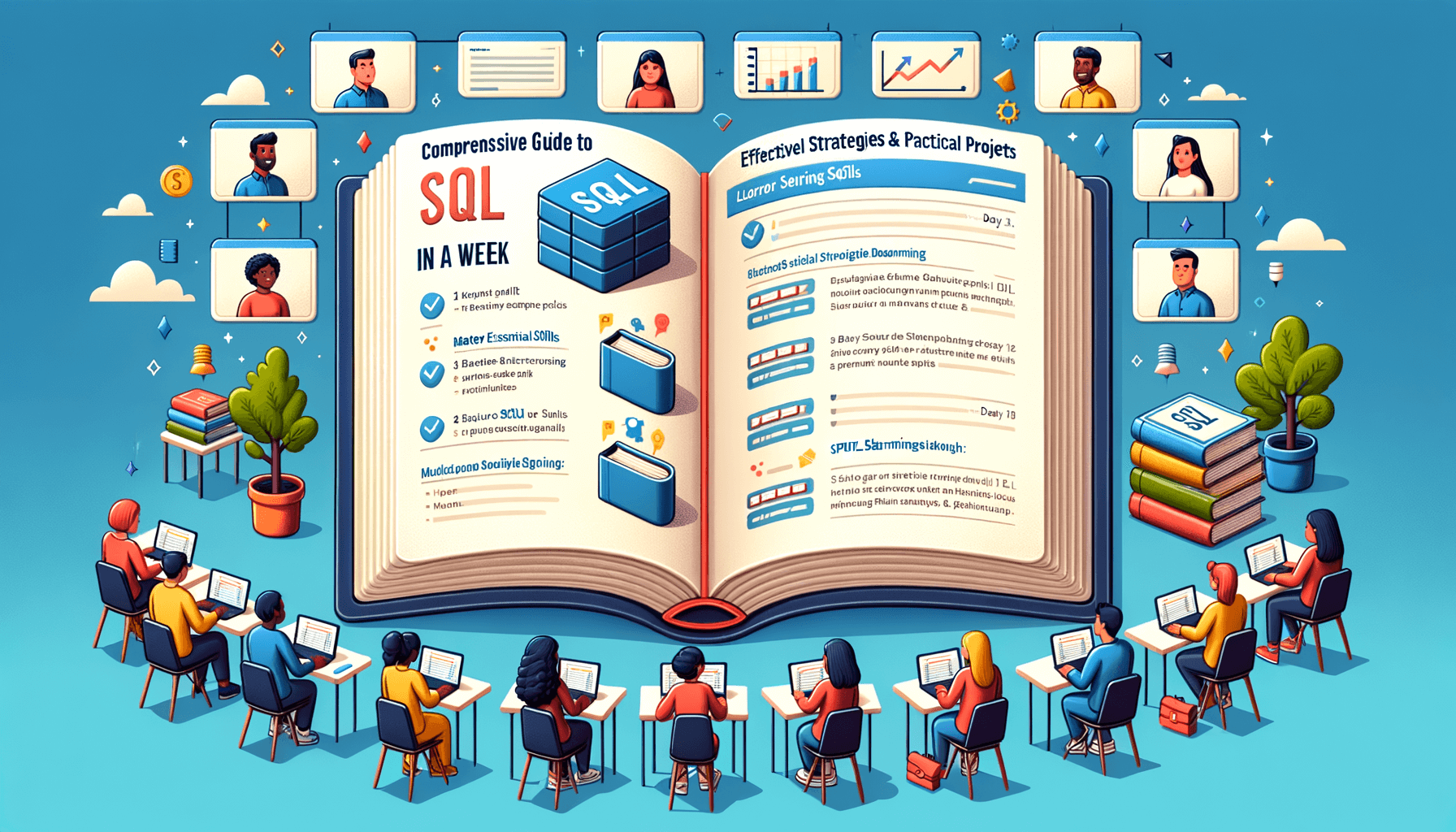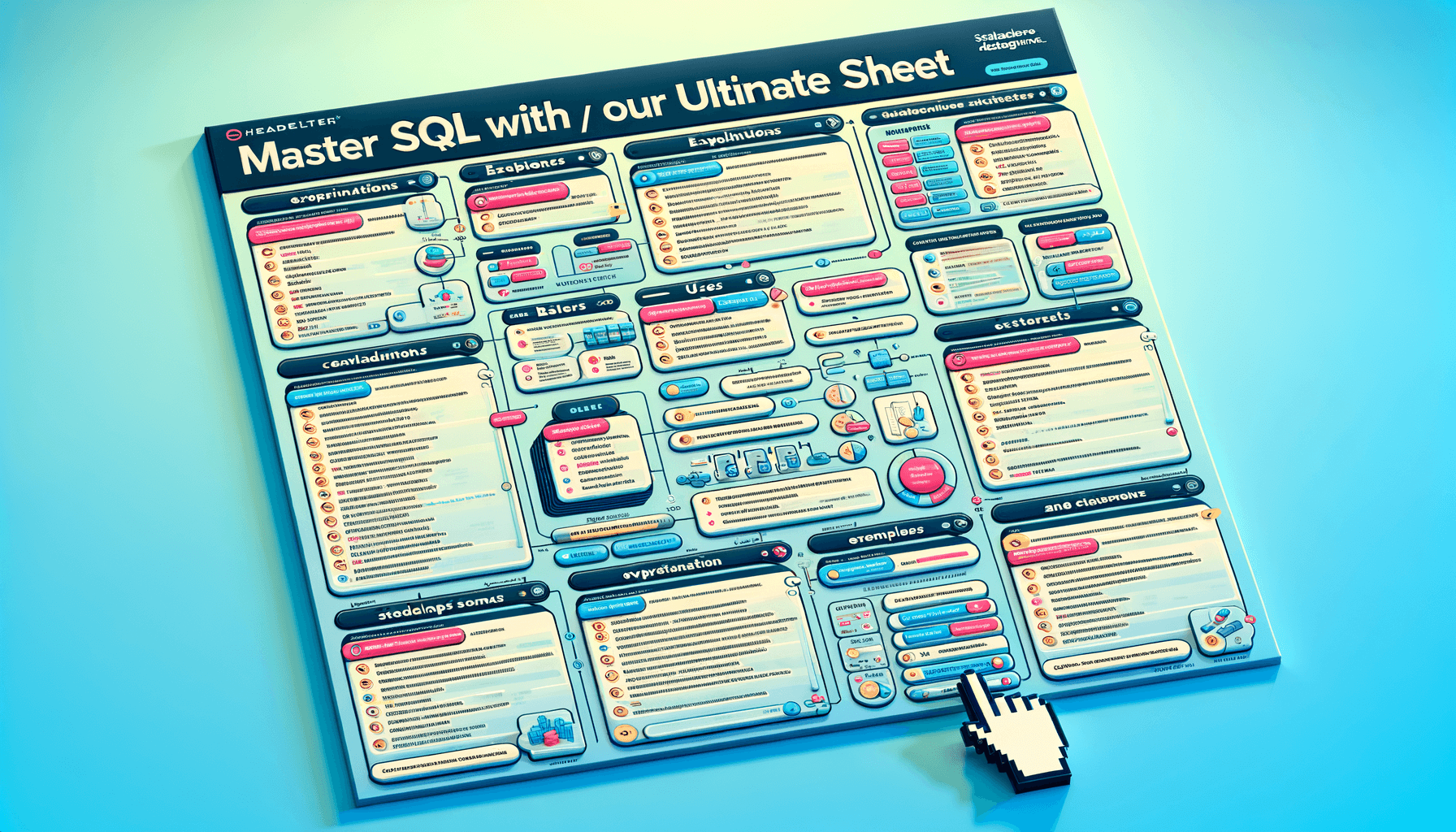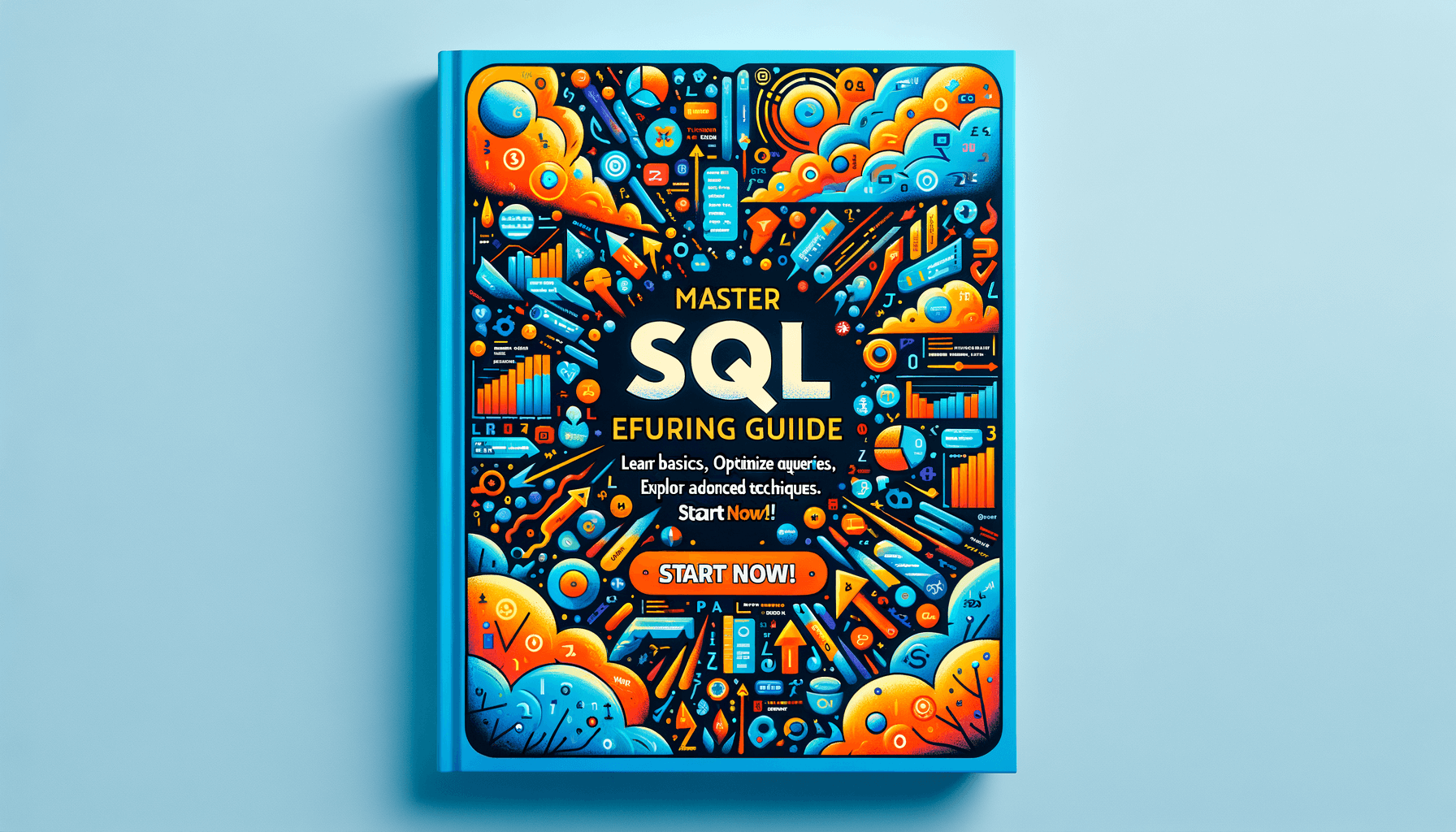A big variety of articles and resources

Can I Learn SQL in a Week? A Comprehensive Guide to Accelerated Learning
 Sia Author and Instructor
Learn SQL
Sia Author and Instructor
Learn SQL
9 minute read
Understanding the Basics of SQL
What is SQL?
Structured Query Language (SQL) is a standardized programming language used to manage relational databases and perform various operations on the data within them. SQL is essential for anyone looking to work with databases, as it allows for efficient data manipulation and retrieval. Whether you're aiming for a quick start to databases or planning to integrate SQL with other technologies, understanding SQL basics is crucial.
Core Concepts and Terminology
To effectively learn SQL, you need to familiarize yourself with some core concepts and terminology:
- Database: An organized collection of data.
- Table: A set of data elements organized in rows and columns.
- Query: A request for data or information from a database.
- Primary Key: A unique identifier for a record in a table.
- Foreign Key: A field in one table that uniquely identifies a row of another table.
These foundational terms will help you navigate through more complex SQL topics and real-world usage scenarios.
Setting Up Your SQL Environment
Learning SQL involves setting up an environment where you can practice writing and executing queries. This typically includes:
- Choosing a Database Management System (DBMS): Popular options include MySQL, PostgreSQL, and SQLite.
- Installing the DBMS: Follow the installation instructions specific to your chosen DBMS.
- Initializing a Database: Create a new database and set up tables to start practicing.
Setting up your SQL environment might seem daunting at first, but it's a crucial step for hands-on learning and mastering SQL basics quickly.
Effective Learning Strategies for SQL
Learning SQL in a week is ambitious but achievable with the right strategies. Here are some effective methods to help you on this journey.
Essential SQL Skills to Master in a Week
Basic Queries and Commands
Mastering basic queries and commands is the foundation of learning SQL. Focus on understanding SELECT, INSERT, UPDATE, and DELETE statements. These commands will allow you to perform essential operations on your database. Additionally, familiarize yourself with the WHERE clause to filter data effectively.
Working with Databases
Understanding how to work with databases is crucial. Learn how to create and manage databases and tables. This includes knowing how to use CREATE, ALTER, and DROP statements. Grasping these concepts will enable you to structure your data efficiently.
Data Manipulation and Retrieval
Data manipulation and retrieval are at the heart of SQL. Practice using JOINs to combine data from multiple tables. Also, get comfortable with aggregate functions like COUNT, SUM, AVG, MIN, and MAX to perform calculations on your data. These skills are essential for extracting meaningful insights from your datasets.
By focusing on these essential skills, you can build a strong foundation in SQL within a week. Remember, consistent practice and application are key to mastering SQL quickly.
Leveraging Online Resources and Courses
Top Online Courses for SQL
When it comes to learning SQL quickly, choosing the right online course can make a significant difference. Effective and rigorous courses with good resources are essential. Platforms like Simplilearn, which is known as the world's #1 online Bootcamp for digital economy skills, offer comprehensive SQL courses. These courses are designed to help you master SQL in a short period. Simplilearn, for instance, provides flexible classes that can be taken online, making it easier to fit learning into your schedule.
Interactive Tutorials and Exercises
Interactive tutorials and exercises are crucial for mastering SQL. Websites like StrataScratch and LeetCode offer practical exercises that allow you to practice SQL queries in real-time. These platforms provide a hands-on approach, which is essential for understanding the core concepts of SQL. By practicing regularly, you can learn SQL quickly and efficiently.
Community and Support Forums
Joining communities and support forums can significantly enhance your learning experience. Platforms like Stack Overflow are invaluable for getting help with specific SQL problems and for learning from the experiences of others. Being part of a community allows you to ask questions, share knowledge, and stay motivated throughout your learning journey.
Imagine completing a semester’s worth of lessons, exams, assignments, and projects in a fraction of the time it would normally take. Accelerated courses make it all possible.
By leveraging these online resources and courses, you can accelerate your SQL learning process and achieve your goals in a week.
Practical SQL Projects for Accelerated Learning
Beginner-Friendly Projects
Starting with beginner-friendly projects is crucial for building a strong foundation in SQL. Creating a simple database for a library system can help you understand basic queries and commands. Another great project is developing a personal budget tracker, which will teach you how to manage and retrieve data effectively.
Advanced Project Ideas
Once you're comfortable with the basics, you can move on to more advanced projects. Consider working on a sales data analysis system to gain insights into data manipulation and complex queries. Another challenging project is building a customer relationship management (CRM) system, which will require you to integrate multiple tables and optimize query performance.
Real-World Applications of SQL
Applying SQL skills to real-world scenarios can significantly enhance your learning experience. Projects like creating a social media analytics dashboard or developing an inventory management system for a small business can provide practical insights and improve your problem-solving abilities.
Working on projects is a fantastic way to showcase and improve your skills. They make for great talking points in job interviews and can significantly boost your portfolio.
Common Challenges and How to Overcome Them
Debugging SQL errors can be a daunting task, especially for beginners. Understanding the error messages and knowing how to interpret them is crucial. Start by breaking down the error message and identifying the part of the query causing the issue. Use online resources and forums to find solutions to common errors.
Optimizing query performance is essential for efficient database management. Focus on writing efficient queries by using proper indexing and avoiding unnecessary columns in SELECT statements. Here are some tips:
- Use indexes wisely to speed up data retrieval.
- Avoid using SELECT *; specify only the columns you need.
- Break down complex queries into simpler subqueries.
Maintaining motivation and consistency can be challenging in an accelerated learning environment. Set clear, achievable goals and track your progress. Join study groups or online communities to stay engaged and motivated.
Remember, the key to overcoming challenges is persistence and a willingness to seek help when needed.
Evaluating Your Progress and Next Steps
Self-Assessment Techniques
Regular self-assessment is crucial to track your learning progress. Reflect on what you've learned by summarizing key concepts and writing down any questions or uncertainties. This method helps reinforce the knowledge acquired by encouraging active reflection on what you’re learning. Moreover, it trains you to think of the concepts more critically while helping you structure your thoughts better when it comes to exam preparation.
Seeking Feedback and Mentorship
Engage with peers, mentors, or online communities to get feedback on your SQL projects. Constructive criticism can provide new insights and help you identify areas for improvement. Mentorship can be particularly valuable, offering guidance and support as you navigate through complex topics.
Planning for Advanced Learning
Once you've mastered the basics, it's time to plan for advanced learning. Identify specific areas of SQL that interest you, such as performance optimization or data warehousing. Create a roadmap for your continued education, setting clear goals and timelines to keep yourself motivated and on track.
The key is trusting yourself by following the path that you’re instinctually most drawn to… because that’s where you’ll find the most short-term motivation & long-term fulfillment.
Evaluating your progress is crucial for continuous improvement. Take the next step in your learning journey by exploring our comprehensive courses designed to enhance your technical skills. Visit our website to discover how we can help you achieve your goals and advance your career.
Conclusion
Learning SQL in a week is an ambitious goal, but with the right resources and dedication, it is certainly achievable. Whether you opt for intensive bootcamps, self-paced online courses, or hands-on tutorials, there are numerous paths to gaining proficiency in SQL quickly. While a week may only allow you to grasp the basics, it sets a solid foundation for further learning and mastery. Remember, the key to success lies in consistent practice and the willingness to explore and apply SQL concepts in real-world scenarios. So, embark on your accelerated learning journey with confidence, and you'll find that SQL can become a valuable skill in your professional toolkit.
Frequently Asked Questions
Can I learn SQL in 2 months?
Yes, you can become proficient in SQL in 2 months if you dedicate at least 20-40 hours per week to learning it. There are plenty of resources like online courses, certifications, and boot camps that will help you learn SQL in no time.
How long do SQL classes and programs typically last?
The duration of SQL classes and programs varies significantly. Traditional college courses typically span a full semester (around 15 weeks). Bootcamps offer intensive training, lasting from a few weeks to a few months. Self-paced learning allows individuals to progress at their own speed.
What is the fastest way to learn SQL?
The fastest way to learn SQL is through hands-on training and practical exercises. Enrolling in bootcamps or intensive courses can also accelerate the learning process. Using interactive tutorials and engaging in real-world projects can enhance your understanding quickly.
How much does an SQL course cost?
The cost of an SQL course can vary widely. For example, an SQL Bootcamp might cost around $975 for 18 hours of training, while a Data Science Certificate program could cost $3,995 for 114 hours of instruction. Prices vary based on the depth and duration of the course.
Will learning SQL increase my salary?
Most companies expect their employees to have SQL skills as they prefer working in a data-driven manner. Having a skillset in SQL will help you analyze data and create better plans for your company. You can expect an increase in salary of up to $40k by becoming proficient in SQL.
What are some useful resources for learning SQL?
Some useful resources for learning SQL include online courses, certifications, and bootcamps. Additionally, there are many interactive tutorials, exercises, and community forums available online to support your learning journey.
Related Articles

Master SQL Effortlessly: Your Ultimate Learn SQL Cheat Sheet
11 minute read

Mastering Databases: How to Learn SQL Code Efficiently
9 minute read

Master Data Management with Our Learn SQL Course
10 minute read


